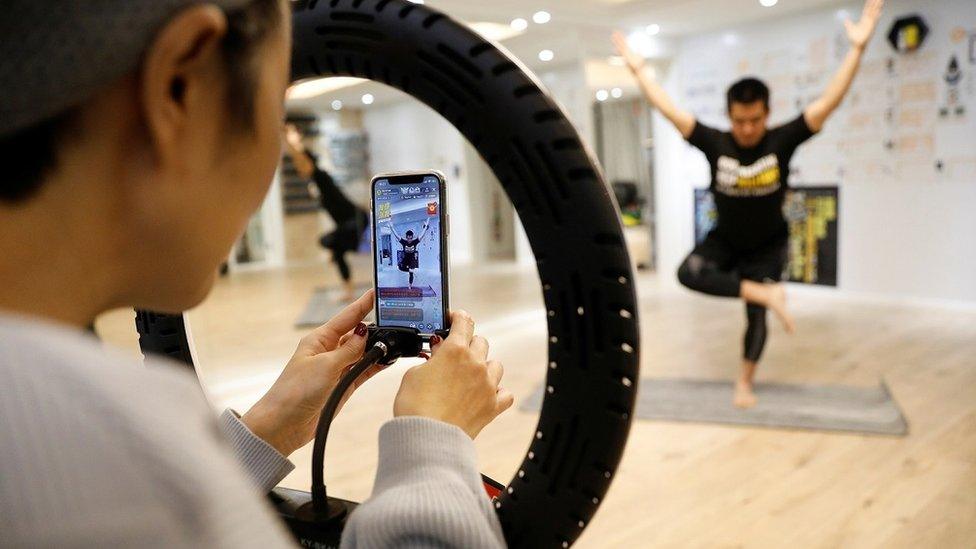Coronavirus: How China is keeping busy during quarantine
- Published

Many businesses such as gyms are turning to live-streaming to help their customers in quarantine
With millions of people across China under lockdown, businesses across the country are trying to come up with ways to keep their customers occupied and connected.
In Hubei province, the epicentre of the coronavirus outbreak, at least 56 million people remain under strict instruction to remain inside their residential communities and villages. At one point, around 500 million people were said to be affected by movement restrictions to contain the virus.
Many people have turned to the internet as one way to cure their boredom.
According to The Paper, searches for the word "boring" on social media site Weibo grew by 626% on 26 January and topics such as "how to spend time at home when bored" also started to trend on the website.
Entrepreneurs began to realise there were ways of keeping in touch with their customers. Here are a few of the methods being used in China right now.
Workout videos at home
Gyms across China have been forced to close amid fears that they could help spread the virus. A number of gyms have started classes online so their customers can keep fit from home.
Lauren Hogan, General Manager for F45 in Shanghai, told the BBC that her gyms are offering workout sessions on WeChat, a popular messaging app in China.
"Every day my trainers have created a circuit-based workout depending on our programming. They've created a sheet of exercises and they are recording videos, but having fun with it too."
Ms Hogan said there are groups in WeChat for customers where they can write in and tell other people they have completed the day's exercise.
"We also did a plank challenge and they had to tag someone in the group to take part," she added.
A student in Wuhan describes what it is like to live under lockdown
She said the videos have helped people talk and know that there is a resource for them, and customers have been appreciative.
"We've had personal thank you messages and also messages in the group chats. People are happy and grateful that we're taking the time to do it and show that we care. When you're stuck in your house, it turns into very long days and having someone else to talk to helps."
Other chains are following suit including Gravity Plus in Beijing. Aside from running online classes, it has also rented out gym equipment as an extra way of bringing in income, Reuters news agency reports.
Clubbing from your living room
With nightclubs closed and music events cancelled for the foreseeable future, a number of DJs and clubs in China are turning to "cloud clubbing".
Cloud clubbing is where people can watch live DJ sets and send in messages to give them the feeling that they're in a club. The cloud clubbing events usually take place on apps such as Douyin, China's TikTok.
TAXX Shanghai is one club that has taken advantage on the demand for "cloud clubbing sessions".

DJs have been live streaming to people in their homes

Ruan Liangliang, manager of TAXX Shanghai told Sixth Tone: "Recently many of our friends and customers have said they are bored with their indoor lives. So we planned a live broadcast to share pleasant music and ease their anxiety., external"
He told the website he was surprised at the positive feedback from those who took part. However despite earning about $104,000 (£80,000) in tips, he says it is not enough to cover the rent.
Strawberry Music Festival, an indie music festival that has been hosted in several Chinese cities, put on its own indoor music festival named "Hi, I am also at home".
The festival was held for five days and featured shows from many musical acts. The shows were pre-recorded, however viewers were able to discuss the music together in the comments section as if they were watching a show together.
Bookshop groups and book lists
Bookshops have also had to think of new ways of reaching customers, a double blow to an industry that is already competing against online shops.
Chengdu Fang Suo Bookstore is located in the trendy Taikoo Li shopping centre in the city. One bookseller who gave their name as Jin Jin told local media, external that it usually brings in customers with its scenery and displays however it has turned to Wechat to help bring in any revenue.
Shop workers made their own lists in WeChat groups including "selected books of the year" and the "recommended reading list of Fang Suo house". Customers could then order the books via their online store.
Elsewhere in China, 1200 Bookstore in Guangzhou, a 24-hour shop, has been selling gift cards, tote bags and "blind gift packages" as a way to bring in income.
In a post written on social media, the store's owner warned its customers that it might not be long before 1200 Bookstore would have to shut permanently. He was inundated with supportive messages from followers, external.
- Published24 February 2020

- Published25 February 2020
